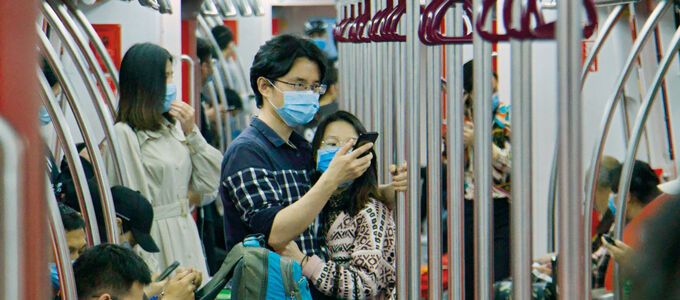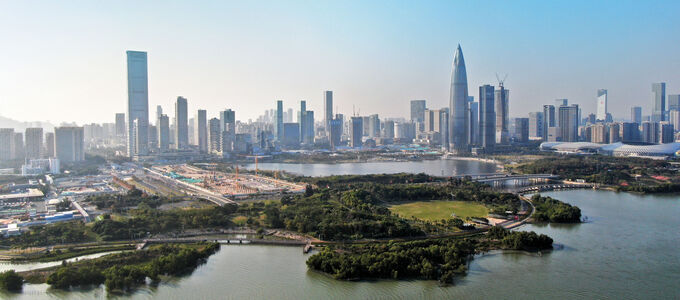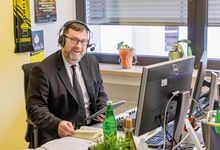One of 1.4 billion
Actually, Lukas wanted to go to Hong Kong or Singapore. But then he was offered a job in Shenzhen, China, after finishing his engineering studies. He told the German magazine spirit what life is like in the world’s most populous country.
The Zoom window on my computer lights up and notifies me that Lukas has joined the session. I see a young man with headphones, sitting on a train. “I’m just on my way home from work,” he explains. Every now and then the sound breaks up, which is really no wonder considering that Lukas is 9,000 kilometres away. He has been living in Shenzhen, in the People’s Republic of China, for one and a half years.
Superlatives
Shenzhen has a population of over 17 million. The city lies in south-central Guangdong province, in south-eastern China. It borders Hong Kong in the south. It is the city with the highest per capita income in China. The main pillars of the local economy are tech-based, the electronics and telecommunications industries. The sheer size of the city never fails to impress Lukas. “Houses here usually have at least twenty floors. I myself live on the 17th floor. Within the city there are several 500- to 600- metre-high hills, but no matter which one I climb, all I see is an endless sprawl of buildings stretching out in front of me.” Yet the city is remarkably green, says Lukas. “There are many parks.”
Communicating
In his spare time, Lukas travels around the country as much as he can. This is scarce by European standards. “At the beginning I had ten days of holidays a year. In the meantime, I have 17. The longer you are with a company, the more holidays you are entitled to, he explains. As a result of the pandemic, he has been able to see a lot of the country in recent months, because: “Most companies in the aviation industry had to shut down their production. That is also the case for us. We are currently only working at 60 per cent capacity, unfortunately we also only receive 60 per cent of our salary. But the extra time has allowed me to travel more,” he says. This is a fantastic opportunity for the globetrotter, because China not only has ultramodern mega cities to offer, but also breathtaking landscapes and countless different cultures. On his travels he has to use the Google translator to make himself understood, because Lukas does not speak fluent Chinese. And in the countryside people don’t speak English, but a different dialect in every province.
Living together
Otherwise his knowledge of Chinese is good enough to order food or tell a taxi driver where he needs to go. In the city he manages well with English, which he also uses to communicate with his friends. How do the Chinese react to foreigners? Have you ever been discriminated? “No”, he says, “in Shenzhen foreigners are nothing out of the ordinary, and if we do make a blunder out of ignorance, the Chinese take it in their stride because they think, ‘O well, he’s a foreigner and doesn’t know any better.’”
Preferences and aspirations
Lukas feels very much at ease in China. “The people are very pleasant and peaceful. They never bully you, I hardly ever experience or witness aggression.” He also likes the fact that there is delicious food to be had on every street corner, and then there is the high technology standard. Traffic is almost exclusively electric and digitalisation is permeating all areas of life. “Apart from the key to my apartment, all I really need is my mobile phone. With it I can prove my identify, can pay for everything, and take care of everything else. When one of my friends had an accident, all the documents were sent to his mobile phone. He could enter all the relevant information there and then the matter was settled.” When he comes to Germany for a visit, Lukas feels like he is travelling back in time to an earlier century.
The last time he was in Germany was, however, more than a year ago because Covid made such a trip almost impossible. Even now that flights are possible again, Lukas feels the risk is too high: “I would have to get tested at least three times before every flight, and if there should be one Covid case on a flight route, the Chinese cancel the flights immediately, and I might not be able to get back.” As a result, Lukas has only been able to see his family by video call.
Since the Chinese government generally is suspicious of religion, and because the regulations on religious practice are very strict, it has so far not been possible for New Apostolic Christians to together for divine services in China. Lukas is therefore very happy that there is such a wide range of pandemic-driven online services and youth meetings. “That helps me a lot, even if it cannot replace fellowship and especially Holy Communion.” That is something that he has learned to appreciate very much precisely because he has not been able to partake of the Lord’s Supper for such a long time. “I certainly took Holy Communion for granted because it was always there.” Lukas hopes that the pandemic will end soon so that he can see his family again and go to church again.
This article was first published in the June 2021 edition of the magazine “spirit”, a German-language magazine for young Christians.



















